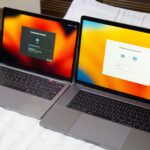If you’ve been laptop shopping recently, you’ve probably come across Chromebooks and thought, Wait, what even is this? At first glance, they look like regular laptops, but they’re running something called ChromeOS instead of Windows. And here’s the thing—depending on what you actually need from a laptop, a Chromebook might not just be cheaper, it might actually be better.
Let’s break it down.
💻 Super Simple, Super Fast
One of the best things about Chromebooks is how simple they are. You open it up, and it’s ready to go. No long boot times, no confusing setup, no bloatware slowing things down. If you’ve ever had a Windows laptop that felt sluggish or took forever to load after just a few months, you’ll know exactly what I mean.
Chromebooks run on ChromeOS, which is basically centered around the Chrome browser. So if most of your daily stuff lives online—like Google Docs, Gmail, YouTube, Netflix, Zoom—you’re covered. And because they’re so lightweight, they tend to feel snappy and smooth even with lower-end hardware.
💸 Big Savings
Let’s be honest—price matters. And this is where Chromebooks really shine. You can get a decent one for under $200. That’s not a typo. Meanwhile, most Windows laptops that are actually usable (not painfully slow) usually start closer to $400 or $500.
Even better, Chromebooks don’t really need antivirus software or paid subscriptions. Google’s productivity tools (Docs, Sheets, etc.) are free, and updates happen quietly in the background. That’s money saved up front and long-term.
🔋 Battery Life That Actually Lasts
Another underrated win: battery life. Because they’re not running a heavy operating system or demanding software, most Chromebooks can last 10+ hours on a charge. That means you can actually get through a school day or work session without stress-scrolling for an outlet.
⚠️ But They’re Not for Everyone
That said, Chromebooks do have limits. If you need to run full desktop apps—like Adobe Photoshop, AutoCAD, or certain finance software—you’ll likely run into roadblocks. Chromebooks aren’t built for that.
Gaming is another area where Windows wins. Sure, you can stream some games through the cloud, but if you’re into PC gaming, you’ll want a real Windows machine with real specs.
🧠 Final Thoughts
Here’s the bottom line: if your laptop needs are pretty simple—web browsing, emails, streaming, video calls, light work or school—a Chromebook is probably all you need. And it’ll save you a good chunk of money without sacrificing the experience.
But if you’re a power user, a creative professional, or someone who needs specific software, Windows is still your best bet.
For a lot of people though? A Chromebook is not just the affordable choice—it’s actually the smart one.


